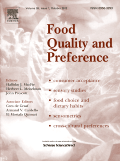
Food Quality and Preference
Scope & Guideline
Uncovering the Science Behind Food Choices
Introduction
Aims and Scopes
- Sensory Evaluation and Consumer Preferences:
The journal emphasizes research on how sensory attributes of food products (taste, smell, texture, appearance) affect consumer preferences and choices. - Sustainability and Food Choices:
There is a strong focus on sustainability in food consumption, including studies on plant-based diets, alternative proteins, and the environmental impact of food choices. - Health and Nutrition:
Research on the health implications of food choices, including studies on labeling, dietary habits, and health-related consumer behavior. - Cultural and Social Influences on Food Consumption:
The journal explores how cultural, social, and psychological factors influence food preferences, acceptance of novel foods, and eating behaviors across different demographics. - Innovative Food Products and Technologies:
The journal publishes studies on new food technologies, including 3D printing, and innovative food products, emphasizing consumer acceptance and sensory evaluation. - Food Waste and Sustainability Practices:
Research on food waste behavior, consumer attitudes towards food waste reduction, and the effectiveness of interventions to promote sustainable practices.
Trending and Emerging
- Plant-Based and Alternative Proteins:
Research on plant-based diets and alternative protein sources is rapidly increasing, reflecting a growing consumer shift towards sustainable eating practices. - Food Technology and Innovation:
The exploration of innovative food technologies, such as 3D printed foods and cultured meats, is gaining traction, highlighting consumer acceptance and sensory evaluations of these products. - Mental and Emotional Influences on Food Choices:
Emerging studies focus on the psychological and emotional factors that influence food preferences, including the impact of food-related emotions and sensory experiences. - Consumer Engagement with Sustainability Labels:
There is an increasing emphasis on understanding consumer responses to sustainability labels and claims, indicating a heightened awareness of environmental impacts. - Cross-Cultural Food Studies:
Research examining food preferences and behaviors across different cultural contexts is trending, reflecting globalization and the diversity of food practices. - Food Waste Reduction Strategies:
Studies targeting consumer behavior related to food waste and strategies to reduce it are becoming more prevalent, aligning with global sustainability goals.
Declining or Waning
- Traditional Food Products:
There is a noticeable decline in research focused on traditional food products and their sensory characteristics, as the emphasis shifts towards innovative and alternative food sources. - General Consumer Behavior Studies:
Broad studies on consumer behavior without specific focus on sensory or health aspects are becoming less common, as more nuanced research is favored. - Static Sensory Analysis Methods:
There is a decrease in the publication of studies employing traditional sensory analysis methods without integrating consumer behavior insights or technological advancements. - Longitudinal Studies on Established Food Products:
Longitudinal studies examining established food products (e.g., traditional meats) seem to be less frequent, possibly due to a shift towards exploring emerging food trends and innovations.
Similar Journals
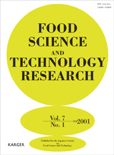
FOOD SCIENCE AND TECHNOLOGY RESEARCH
Driving Progress in Food Science and EngineeringFOOD SCIENCE AND TECHNOLOGY RESEARCH, published by the Japanese Society of Food Science & Technology, is a pivotal journal that encompasses a wide spectrum of research in the fields of food science, biotechnology, and engineering. With its ISSN number 1344-6606 and a digital counterpart E-ISSN 1881-3984, this journal aims to disseminate cutting-edge research and innovative technologies that enhance food safety, quality, and sustainability. Recognized for its contributions, it holds a Q3 category ranking in multiple disciplines, including Food Science and Biotechnology, indicating a significant role in advancing academic discourse. Researchers and professionals can benefit from its insights, as the journal covers an array of topics relevant to industrial applications, marketing strategies, and scientific advancements. Although not an open-access journal, it has a wide reach and is committed to providing high-quality, peer-reviewed content essential for scholars and practitioners in the food science community from 1999 to 2024.

Foods
Exploring the Science of Nutrition and Sustainability.Foods is a premier open access journal published by MDPI, based in Switzerland, that has been at the forefront of disseminating high-quality research in the fields of food science, health professions, and plant science since its establishment in 2012. With an impressive convergence of interdisciplinary studies spanning various aspects of food, nutrition, and microbiology, the journal aims to provide a comprehensive platform for researchers and professionals to share innovative ideas and findings. Maintained as a Q1 journal in multiple categories for 2023, including Food Science and Health Professions, Foods has garnered significant recognition within the academic community, reflected in its strong Scopus rankings and percentiles across various disciplines. The journal not only promotes open access to enhance the visibility and accessibility of research but also encourages the exploration of sustainable food systems and health-related issues, thus contributing to essential discussions in today's society. For those looking to advance their understanding and expertise in food-related sciences, Foods serves as an enduring resource for groundbreaking studies and critical insights.
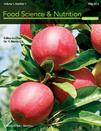
Food Science & Nutrition
Exploring the vital links between food and wellness.Food Science & Nutrition is an esteemed peer-reviewed journal published by WILEY, dedicated to advancing the fields of food science and nutritional research. With an impressive impact factor and a prestigious Q1 ranking in the Food Science category, this journal stands out as a leading platform for innovative research, offering meaningful insights into the relationship between food composition and health outcomes. Since its transition to Open Access in 2013, Food Science & Nutrition has championed the global dissemination of knowledge, ensuring that vital research is accessible to researchers, professionals, and students alike. With a vast scope that encompasses both agricultural and biological sciences, the journal provides a comprehensive view of emerging trends, methodologies, and applications in food security and nutrition, making it indispensable for those invested in these critical areas.
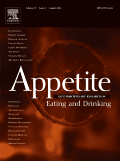
APPETITE
Advancing Knowledge in Nutrition and PsychologyAPPETITE, a premier journal published by Academic Press Ltd - Elsevier Science Ltd, serves as an essential platform within the fields of Nutrition and Dietetics and Psychology. With an impressive impact factor, this Q1 ranked journal in both categories demonstrates its high visibility and influence, positioned at the forefront of research related to dietary behaviors, food preferences, and psychological influences on eating. Researchers and professionals can expect rigorous peer-reviewed articles that address current trends and challenges, making it invaluable for those seeking to enhance their understanding of appetite regulation and its multifaceted implications. While APPETITE does not offer open access, its esteemed reputation and Scopus rankings—18th in General Psychology and 19th in Nutrition and Dietetics—underscore its significance as a critical resource for those engaged in these dynamic fields of study.
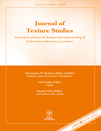
JOURNAL OF TEXTURE STUDIES
Innovating Sensory Quality in Food and PharmaceuticalsThe JOURNAL OF TEXTURE STUDIES, published by WILEY, stands as a pivotal resource in the fields of food science and pharmaceutical science. Founded in 1969 and continuing through 2024, this esteemed journal (ISSN: 0022-4901, E-ISSN: 1745-4603) dedicates itself to the study of texture—a critical parameter in product development, quality control, and consumer preference. With a strong presence in the Scopus rankings, it is positioned in the Q2 quartile for both Food Science and Pharmaceutical Science, reflecting its significant contribution to research and innovation in these disciplines. The journal does not operate on an open access model, providing a curated selection of peer-reviewed articles that highlight advancements and methodologies in texture analysis. Its pivotal role in bridging theoretical research with practical applications makes it an essential read for researchers, professionals, and students committed to exploring and enhancing the sensory attributes of food and pharmaceutical products.
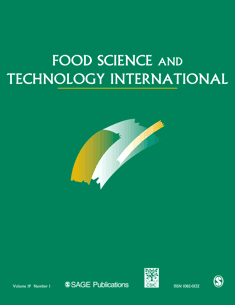
FOOD SCIENCE AND TECHNOLOGY INTERNATIONAL
Advancing innovation in food science and technology.FOOD SCIENCE AND TECHNOLOGY INTERNATIONAL, published by SAGE Publications Ltd, is a premier journal in the fields of food science and technology, serving as a crucial platform for the dissemination of innovative research and practical applications from 1995 through to 2024. With an impact factor reflecting its significant standing—ranking in the Q2 quartile for Chemical Engineering, Food Science, and Industrial and Manufacturing Engineering—this journal plays an instrumental role in advancing the interdisciplinary study of food systems. Researchers, professionals, and students can access high-quality contributions that address the latest developments and trends in food technology, safety, and processing. Located in the United States, FOOD SCIENCE AND TECHNOLOGY INTERNATIONAL also boasts commendable Scopus rankings, ensuring its articles are both relevant and widely cited within the academic community. As a vital resource for anyone engaged in food science research, этот журнал fosters knowledge sharing and innovation in the ever-evolving landscape of food technology.
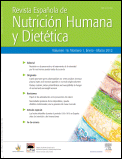
Revista Espanola de Nutricion Humana y Dietetica
Exploring the science of nutrition for global impact.Revista Espanola de Nutricion Humana y Dietetica is a pivotal open-access journal dedicated to advancing the study of human nutrition and dietetics. Published by the ASOC ESPANOLA DIETISTAS NUTRICIONISTAS in Spain, this journal has been making significant contributions to the field since its inception in 2011. With an ISSN of 2173-1292 and an E-ISSN of 2174-5145, it provides researchers and practitioners with a valuable platform for disseminating innovative research, case studies, and reviews related to nutrition science. Although currently ranked Q4 in both Food Science and Nutrition and Dietetics categories (2023), the journal is committed to raising its academic profile by fostering high-quality publications that address contemporary issues in nutrition. Open access since 2012, it ensures that research is readily available to a global audience, thus promoting the exchange of knowledge and best practices. Emphasizing the importance of dietary interventions and public health nutrition, the journal encourages contributions that bridge theory and practical applications, appealing to a broad spectrum of professionals, researchers, and students within the field.
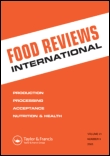
FOOD REVIEWS INTERNATIONAL
Championing Comprehensive Reviews in Food ScienceFOOD REVIEWS INTERNATIONAL, published by Taylor & Francis Inc, serves as a pivotal resource within the fields of Food Science and Chemical Engineering. Established in 1985, this esteemed journal offers a comprehensive platform for the dissemination of critical reviews that enhance understanding and innovation in the food industry. With an impressive impact factor reflecting its Q1 quartiles in both Food Science and Chemical Engineering categories, it ranks among the top journals in Scopus, securing the 24th spot in Agricultural and Biological Sciences. Scholars, researchers, and professionals are encouraged to explore its rich content, which spans meticulously reviewed articles that bridge academic research and practical applications, while contributing to advancements in food safety, processing, and sustainability. Although not an Open Access journal, access to its extensive repository is vital for anyone aiming to stay at the forefront of food science advancements.

International Journal of Gastronomy and Food Science
Unveiling the Cultural Significance of Food Through ResearchThe International Journal of Gastronomy and Food Science, published by ELSEVIER, serves as a premier platform for scholars and practitioners in the domains of gastronomy and food science. With an ISSN of 1878-450X and E-ISSN 1878-4518, this journal has been recognized for its impact, holding a prestigious Q1 ranking in Cultural Studies and a Q2 ranking in Food Science as of 2023, thereby reflecting its influence and relevance in the field. It is particularly noted for its robust Scopus rankings, placing 28th out of 1304 in Social Sciences - Cultural Studies, advocating for high-quality research with a 97th percentile ranking, and 117th in Agricultural and Biological Sciences – Food Science with a 70th percentile ranking. This open-access journal offers a comprehensive exploration of food-related issues, aiming to bridge the gap between culinary arts and scientific research, enhancing the understanding of food systems and cultural significance. For researchers, professionals, and students alike, the International Journal of Gastronomy and Food Science is an invaluable resource, dedicated to fostering innovation and comprehensive discourse in culinary studies.

INTERNATIONAL JOURNAL OF FOOD SCIENCES AND NUTRITION
Navigating the complexities of food and nutrition science.International Journal of Food Sciences and Nutrition, published by Taylor & Francis Ltd, is a premier, peer-reviewed journal that has established itself as a leading platform for the dissemination of cutting-edge research in the field of food science and nutrition. With an impressive Q1 categorization and an academic rank of #59/389 in Scopus’s Agricultural and Biological Sciences category, this journal is recognized for its significant impact, facilitating critical discussions and advancements related to food quality, safety, and nutritional health. Its historical significance, covering research from as early as 1947 to the present day, underscores the journal's long-standing commitment to scientific rigor and innovation. Researchers and professionals benefit from this journal's comprehensive and diverse range of studies, contributing to informed practices and developments in the food industry and public health. Although the journal is not open access, it provides various access options, ensuring that high-quality research is available to academics and practitioners alike. Stay connected with current trends and breakthroughs in food sciences and nutrition through this highly respected publication.